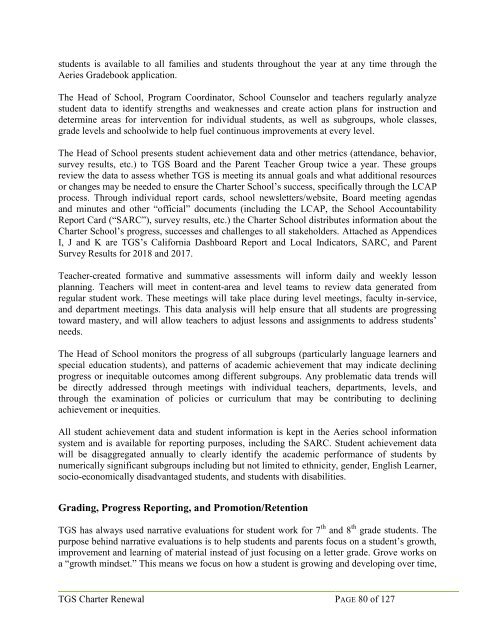Grove School Renewal Charter FINAL Version - 2019
Create successful ePaper yourself
Turn your PDF publications into a flip-book with our unique Google optimized e-Paper software.
students is available to all families and students throughout the year at any time through the<br />
Aeries Gradebook application.<br />
The Head of <strong>School</strong>, Program Coordinator, <strong>School</strong> Counselor and teachers regularly analyze<br />
student data to identify strengths and weaknesses and create action plans for instruction and<br />
determine areas for intervention for individual students, as well as subgroups, whole classes,<br />
grade levels and schoolwide to help fuel continuous improvements at every level.<br />
The Head of <strong>School</strong> presents student achievement data and other metrics (attendance, behavior,<br />
survey results, etc.) to TGS Board and the Parent Teacher Group twice a year. These groups<br />
review the data to assess whether TGS is meeting its annual goals and what additional resources<br />
or changes may be needed to ensure the <strong>Charter</strong> <strong>School</strong>’s success, specifically through the LCAP<br />
process. Through individual report cards, school newsletters/website, Board meeting agendas<br />
and minutes and other “official” documents (including the LCAP, the <strong>School</strong> Accountability<br />
Report Card (“SARC”), survey results, etc.) the <strong>Charter</strong> <strong>School</strong> distributes information about the<br />
<strong>Charter</strong> <strong>School</strong>’s progress, successes and challenges to all stakeholders. Attached as Appendices<br />
I, J and K are TGS’s California Dashboard Report and Local Indicators, SARC, and Parent<br />
Survey Results for 2018 and 2017.<br />
Teacher‐created formative and summative assessments will inform daily and weekly lesson<br />
planning. Teachers will meet in content‐area and level teams to review data generated from<br />
regular student work. These meetings will take place during level meetings, faculty in-service,<br />
and department meetings. This data analysis will help ensure that all students are progressing<br />
toward mastery, and will allow teachers to adjust lessons and assignments to address students’<br />
needs.<br />
The Head of <strong>School</strong> monitors the progress of all subgroups (particularly language learners and<br />
special education students), and patterns of academic achievement that may indicate declining<br />
progress or inequitable outcomes among different subgroups. Any problematic data trends will<br />
be directly addressed through meetings with individual teachers, departments, levels, and<br />
through the examination of policies or curriculum that may be contributing to declining<br />
achievement or inequities.<br />
All student achievement data and student information is kept in the Aeries school information<br />
system and is available for reporting purposes, including the SARC. Student achievement data<br />
will be disaggregated annually to clearly identify the academic performance of students by<br />
numerically significant subgroups including but not limited to ethnicity, gender, English Learner,<br />
socio‐economically disadvantaged students, and students with disabilities.<br />
Grading, Progress Reporting, and Promotion/Retention<br />
TGS has always used narrative evaluations for student work for 7 th and 8 th grade students. The<br />
purpose behind narrative evaluations is to help students and parents focus on a student’s growth,<br />
improvement and learning of material instead of just focusing on a letter grade. <strong>Grove</strong> works on<br />
a “growth mindset.” This means we focus on how a student is growing and developing over time,<br />
TGS <strong>Charter</strong> <strong>Renewal</strong> PAGE 80 of 127



